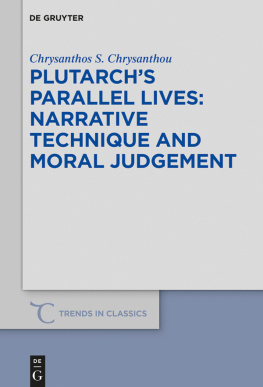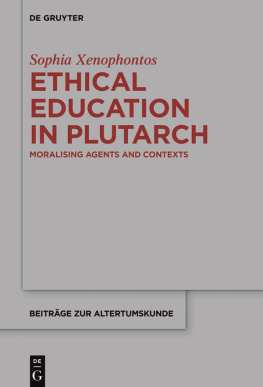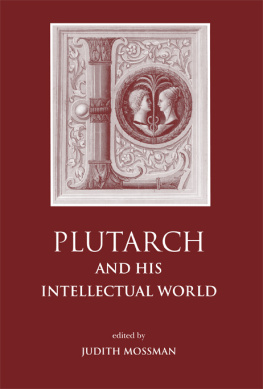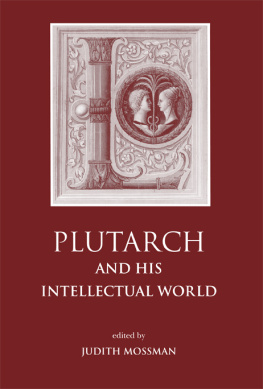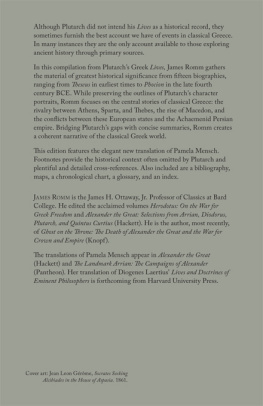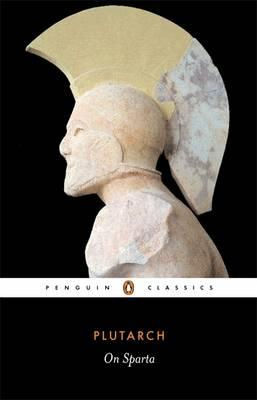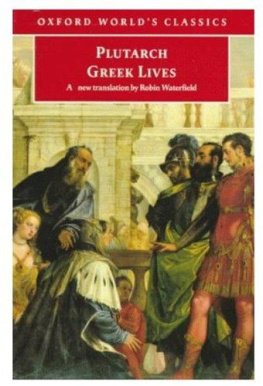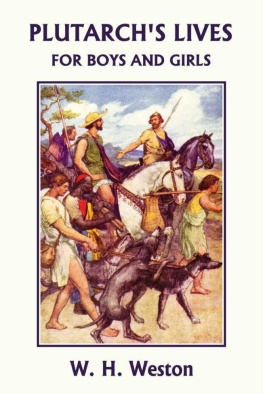Contents
Guide

Chrysanthos S. Chrysanthou
Plutarchs Parallel Lives Narrative Technique and Moral Judgement
Trends in Classics Supplementary Volumes

Edited by
Franco Montanari and Antonios Rengakos
Associate Editors
Evangelos Karakasis Fausto Montana Lara Pagani Serena Perrone Evina Sistakou Christos Tsagalis
Scientific Committee
Alberto Bernab Margarethe Billerbeck
Claude Calame Jonas Grethlein Philip R. Hardie
Stephen J. Harrison Richard Hunter Christina Kraus
Giuseppe Mastromarco Gregory Nagy
Theodore D. Papanghelis Giusto Picone
Tim Whitmarsh Bernhard Zimmermann
Volume 57

ISBN 978-3-11-057298-8
e-ISBN (PDF) 978-3-11-057471-5
e-ISBN (E-PUB) 978-3-11-057391-6
ISSN 1868-4785
Library of Congress Cataloging-in-Publication Data
A CIP catalog record for this book has been applied for at the Library of Congress.
Bibliographic information published by the Deutsche Nationalbibliothek
The Deutsche Nationalbibliothek lists this publication in the Deutsche Nationalbibliografie; detailed bibliographic data are available in the Internet at http://dnb.dnb.de.
2018 Walter de Gruyter GmbH, Berlin/Boston
Editorial Office: Alessia Ferreccio and Katerina Zianna
Logo: Christopher Schneider, Laufen
www.degruyter.com

For my parents, Stelios and Andri,
and my grandmother, Erato
Preface
This book is a slightly revised version of my Oxford D.Phil. thesis completed in June 2016. I gratefully acknowledge the generous support of the Greek State Scholarships Foundation (IKY), the Alexander S. Onassis Public Benefit Foundation, the A.G. Leventis Foundation, and the Deutscher Akademischer Austauschdienst (DAAD).
Thanks are also due to many people who have helped me along the way. First of all, I am extremely grateful to Christopher Pelling who has supervised my doctoral dissertation with the utmost professionalism, gentle criticism, and enthusiasm. I owe sincere thanks also to my examiners, John Marincola and Tim Rood, for their perceptive comments and constructive criticism. Moreover, I wish to express my warmest of thanks to Jonas Grethlein for his generous engagement with the thesis and for giving me the opportunity to work in the Classics Department in Heidelberg, where I managed to complete this book in the most collegial, hospitable, and convenient academic environment. I also remain deeply grateful to Amphilochios Papathomas, my tutor at the University of Athens, for all his tireless advice and support. Besides, I owe special debts to Philip Stadter for his acute comments on a very early draft of chapter five on Plutarchs comparative epilogues and to Timothy Duff for being a source of inspiration and for offering me exceptionally thoughtful feedback on several ideas I discuss with him on Plutarch. My warmest thanks are also due to Fran Titchener for her kind advice and stimulating discussions on Plutarch. Moreover, I reserve special gratitude for Franco Montanari and Antonios Rengakos, who as editors of De Gruyters Trends in Classics included my book in their series, and for the two readers of the series for their remarks on the manuscript. Last but not least, I wish to express my heartfelt gratitude to my family for their infinite patience, encouragement, and support.
Chrysanthos S. Chrysanthou
Heidelberg, July 2017
1Introduction: Plutarchs Lives , Moralism, and Narrative Technique
1.1A Game for Two
Many readers in recent years have stressed that Plutarchs moralism in the Lives goes much further than simply allocating praise or blame. Christopher Pelling has argued that Plutarch is less (or at least not only) concerned with protreptic and expository moralismin the form of do that or do not do that, this is what is good or this is what is badbut rather with descriptive and exploratory moralism, which points towards, and prompts reflection on, ethical truths about human behaviour and shared human experience.
The work of these scholars has been extremely illuminating in recognising the challenging and interrogatory nature of the moralism of the Lives as well as their narrative sophistication, an important aspect of which is how they elicit from readers an active engagement with the process of moral evaluation. Rather, he develops strategies of problematising, and of prompting his readers as well to problematise, questions of moral judgement.
In the course of the biographical book, This is also the case when readers confront gaps or silences in the text, temporal displacements, and evocations of past and future, or when they may recognise intertextuality. All these devices prove highly effective in increasing readers engagement with moral evaluation, sensitising them to exploratory parallels and wider contexts that inform their act of judging in many challenging ways.
Plutarchs technique of polarising presentation works effectively to this end too. Plutarch frequently lays out before readers a complex array of different explanations and interpretations (even ones with which he explicitly disagrees), or multiple evaluative responses, including conflicting and progressively shifting praise-and-blame judgements. Rather than being a sign of Plutarchs immature and insecure work method, as Barbara Scardigli thinks (with reference to the Life of Lucullus ),
In Plutarch these opposed strands and alternative perspectives often allude to views and experience that were contemporary with the events related. Indeed, an issue throughout our analysis will be the way(s) that Plutarchs delving into the minds where appropriate, I make some comparison and (occasionally) notice parallels with historians and other genres, in particular tragedy and the ancient novel, in order to bring out the importance of Plutarchs narrative technique.
Our study examines the representation of experimental moralism of Plutarchs Parallel Lives . Building upon and verifying further recent research on the challenging and exploratory, rather than affirmative, moral impact that the Lives are designed to have on their readers, this book seeks to describe and analyse the range of narrative techniques that Plutarch employs to draw his readers into the process of moral evaluation and expose them to the complexities and difficulties
Most of this inquiry will inevitably be concerned with the constructed narrator (Plutarch), although that does not exclude some bleeding into that construction of features of the flesh-and-blood author (e.g. Cim . 12; Dem . 13). Naturally, our knowledge of the real-life Plutarch largely comes from the text; but that would not be the case for all or even most of his immediate audience. In a to the reading process, and there are times when their extratextual experience is important. The constructed readers in fact can be used as a pointer to what real readers might bring to the work and how they might respond. This becomes particularly interesting, as we shall see, in those cases where there may be a tension between the two, with the implied readers serving as an implausible analogue but plausible ideal for the real readers.

